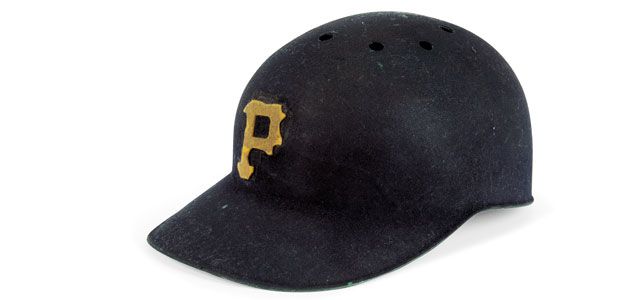Roberto Clemente was born and raised in the small town of Carolina, Puerto Rico in the early 1930’s. He was the youngest of seven children.1 From a young age he excelled at baseball and at the track event Javelin. At age eighteen, he tried out for the Brooklyn Dodgers. Roberto made the team with ease in 1952, but this is where his trials began. The Dodgers had five African-American players on the team already, including the famous Jackie Robinson. The owners saw no need for another “colored” player on the team.2

After his contract with the Dodgers’ minor league team in Montreal expired, the young Pittsburgh Pirates organization picked up Clemente in order to rebuild their team. But the Pirates didn’t give him a lot of playing time either, so he decided to return to Puerto Rico.3 But in 1956, after dominating back in his home town, Roberto finally caught his break with the Pirates. He returned to the United States, and he began to rise in fame rapidly, gaining success in the League. In his first season he finished with a batting average of .255. This success didn’t smash the curveball that was thrown his way because of his race. On several occasions, his teammates called him a “nigger.” It was also common for Clemente to stay in separate hotels from the white players on the team, due to segregation laws. Young Clemente was not even treated as an equal in the sport that he had been working so hard for years to adapt to.4 Whether it was the law, or people’s racial prejudices, Clemente continued to remain the outsider.
The Pirates eventually won the World Series in 1960, and Roberto Clemente finished that season with the stellar batting average of .310. As Clemente began to rise in fame, and people began to realize his potential for greatness, he began to receive death threats in the mail. One of the letters read “Did you ever get shot before?”5 In fear for his family’s safety, Clemente moved them home to Puerto Rico in order to protect them from such bigoted Americans of the 1960’s. After moving his family back to Puerto Rico, Clemente told the media, “I don’t want to be put down because I’m Puerto Rican. I don’t stand for disliking someone because of their color. If this is the case, I don’t want to be living. I am a double nigger….. for my skin and my heritage.”6
After Clemente moved his family back to Puerto Rico, and bounced back from the serial experience of death threats, and he became the League’s MVP in 1966.7 Clemente refused to let others keep him down because of the color of his skin. Clemente was not only an inspiration to people on the field, but was so off the field as well. In his spare time he would visit Puerto Rico in order to spend time with his family. But he also gave back to the struggling community he grew up in by helping out in the local clinic in Carolina. He also opened youth baseball programs for kids in Puerto Rico.8 Roberto helped raise over $150,000 for his home town. Clemente’s love for others, and actions in order to help his people and the community, was recognized by people all over the United States. He was becoming one of the most well-known athletes not only for his incredible playing abilities, but for his devotion to his personal humanitarian aspirations.
Then suddenly, on New Years Eve in 1972, while flying to Nicaragua to drop supplies off after a tragic earthquake, Roberto Clemente’s plane crashed. There were no survivors and Roberto Clemente’s body was never found. The plane was allegedly 1,900 kilograms over the weight it could carry.9

Roberto Clemente finished his career with over 3,000 hits, 4 World Series titles, 12 Golden Gloves, a two-time League MVP, and was inducted into the Hall of Fame in 1973.10 Roberto Clemente is remembered in Major League Baseball for so much more than these incredible stats. To this day, the MLB gives the Humanitarian Award to baseball players who best exemplify service to their team, community, and families.11 Clemente will forever be recognized for his love for others. And he fought for a sport he loved. There is much diversity in the MLB today, whether it is Yu Darvish from Japan, Didi Gregorius from the Netherlands, Arolodis Chapman from Cuba, or Carlos Correa from Puerto Rico. Clemente is a major reason for this diversity. He received death threats and experienced discrimination because of his color. But, most importantly, after all these trials, Clemente still managed to give back to his community and love others, which is why he’s an inspiration to Latinos and to people everywhere.
- Alan West, Roberto Clemente: Baseball Legend (Brookfield, Conn: Lerner Publishing Group, 1993), 6. ↵
- Salem Press Biographical Encyclopedia, January 2017, s.v. “Roberto Clemente,” by Lynn C. Kronzek. ↵
- Alan West, Roberto Clemente: Baseball Legend (Brookfield, Conn: Lerner Publishing Group, 1993), 10-12. ↵
- Alan West, Roberto Clemente: Baseball Legend (Brookfield, Conn: Lerner Publishing Group, 1993), 10-12. ↵
- Roberto Clemente. n.p.: (Washington, D.C.): Federal Bureau of Investigation, 2003. ↵
- Alan West, Roberto Clemente: Baseball Legend, (Brookfield, Conn: Lerner Publishing Group, 1993), 13. ↵
- Salem Press Biographical Encyclopedia, January 2017, s.v. “Roberto Clemente,” by Lynn C. Kronzek. ↵
- Alan West, Roberto Clemente: Baseball Legend (Brookfield, Conn: Lerner Publishing Group, 1993) 19-25. ↵
- Madeleine White, “Baseball’s Roberto Clemente dies in a plane crash,” Globe & Mail , 2015, A2. ↵
- Salem Press Biographical Encyclopedia, January 2017, s.v. “Roberto Clemente,” by Lynn C. Kronzek. ↵
- Wes Lukowsky, “Clemente: The True Legacy of an Undying Hero,” Booklist 110, no. 1 (2013): 30. ↵



53 comments
Matthew Rios
It’s always nice to hear about these sort of stories given recent events in football. Players making it to the top to represent their people is always a wonderful story, especially in baseball. It’s such an American sport and I really didn’t come to appreciate it until I got older. I started to understand that it’s not just about watching a guy throw a ball and another to hit it. It’s about getting together with the family with hotdogs and fries to watch a fun competition! Truly American.
Andrea Chavez
It is always such a great honor to read, and to learn about a Hispanic or Latino Icons; as I am from Mexico im glad even in the US we represent are country with a bunch of honor. It is delightful to learn that Roberto Clemente not only astonished the world with his physical ability during sports but with his inspiration to minorities. Reading this articles makes me really proud of who Mexicans are becoming.
Clarissa Bustamante
This article was such an interesting one. The fact that I am such a huge baseball fan only because I grew up watching it. Roberto Clemente has been a baseball hero for a very long time now. He is such an inspirational person and player. Roberto was a very great and talented player he produced many stats within his baseball career. It is amazing how he was able to look passed all the hate and death threats just to continue to have funny playing the sport he enjoyed and loved the most.
Karina Nanez
This is a truly incredible article to read. I do not know much about sports but it always makes me very happy when I read stories of players who overcame almost insurmountable prejudices like racism and bigotry. Roberto Clemente is a fantastic example of this, and what makes his story even more touching is how he was able to give so much back to his community before he died.
Ryann Cervantes
Great article and certainly deserving of its nomination. I really enjoyed reading about the perseverance of Roberto Clemente and how he fought for a good cause. It’s sad he died while on his way to help but that is one good way to go out. I honestly haven’t heard of him before, despite my knowledge of baseball and I think he should be recognized more.
Soteria Banks
i love these type of stories, the overcomer . Roberto had everyone against him but he kept doing the thing he loved and continued to help his community. I don’t think people understand what it feels like to be a minority in the united states. Off the back you are judge, and they feel like they are better than you. why is it that the good die young. I read a lot of articles that are like that especially for Latinas, Puerto Ricans, Hispanics, with them dying young tragically. Rest in peace Roberto Clemente
Mariet Loredo
Great article! It really tells the story of Roberto Clemente and all he lived for. It’s amazing how someone can go thorough many tough obstacles like Clemente and still be able to continue fighting for what they want. I love reading about Latinos standing up for what they believe in and for people to write about their stories because sometimes I feel that these stories are not told enough.
Maria Callejas
I am so happy your article is nominated for the best “People” one. I say this because I truly believe this is a beautifully written tribute to an amazing person. I have a great deal of respect towards Roberto Clemente. As I said in my first comment, as a Nicaraguan, I am aware of how Roberto Clemente wanted to help Nicaragua after the ’72 earthquake. He died on his way to Nicaragua. So just to think that his last motive was to help other is amazing. Best of luck!
Samman Tyata
Wow! I really loved reading your article. The context is completely new for me. Not only the context, the sport baseball is completely new for me. It was interesting to know that he was a major contributor in the world of baseball. Moreover, it’s really inspiring that although he didn’t received the playing time he continued to do what he did and it worked out in the end for him. To sum it up, it was a good read.
Joshua Breard
Roberto Clemente is a hero to all athletes. His story of overcoming racial difficulties shows how he is one of the strongest people to enter the MLB. He might not get much attention as legends such as Jackie Robinson but he truly is an inspiration to all. I can see why this is an award winning article. Great job bro, well deserved nomination.